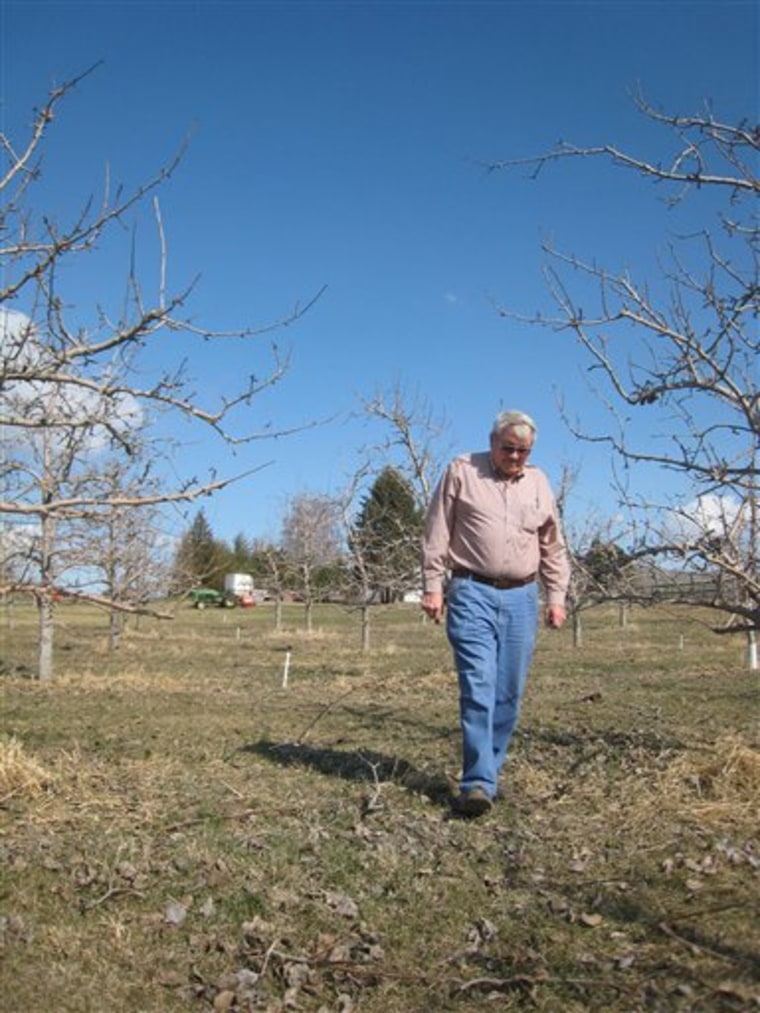Ray Colbert wanted out after five decades of growing apples, but his son didn't want the farm in northern Washington. No one else did either.
So, Colbert sold the last big piece of his operation, an 80-acre parcel, to a buyer far downstate who wanted what came with the land: water from the Okanogan River.
State regulators signed off on the buyer's request to transfer the rights to the water and let it flow hundreds of miles down river, figuring the deal was good for fish and wouldn't hurt anyone else's water supply.
Local officials, however, fear such deals will dry out their rural farming community.
"If this were to snowball and keep up, Okanogan County would literally dry up. It would dry up its economy, its agricultural production and everything else," said state Sen. Bob Morton, a Republican whose rural district sprawls across remote northern Washington.
Moving water around the West is nothing new — it's what enabled apples to sprout in this area in the first place. In Northern California, river water is diverted south to irrigate most of the country's winter vegetables and keep faucets flowing in the Los Angeles area.
Officials in northwest Montana are negotiating a water compact with the Blackfeet Indian Reservation that would allow the tribe to sell water from the headwaters of the Missouri River to any place in the vast swath of the state that lies in the river's basin.
"There's no constraint where they can market that water to — hundreds and hundreds of miles," said John Tubbs, administrator of the Montana Department of Natural Resources water resources division.
Such moves don't come without dispute. Ranchers and conservationists are fighting a plan to pump billions of gallons of water from rural Nevada and send it to Las Vegas.
More fights are likely as farmers find they get a bigger payoff from selling their water than by growing crops, since Western water law allows water rights to be separated from land.
Farmer: Water is property
For Colbert, the decision wasn't difficult.
"The Okanogan Valley's a great place to live. I love it, but it's a tough place to make a living," Colbert said. "I'm so relieved to basically be out of these big orchards."
He shares the concerns of local officials but also says his water right is his to do with as he pleases.
"It's a property, like a truck or a cow, and you should have the right to do as you wish with it," he said.
The buyer, Andy den Hoed, had been seeking water for his growing vineyards above the Columbia River in south-central Washington for years, with little success. He dismisses the notion that enough water will be transferred down the Okanogan and into the Columbia to make a big difference for northern farming communities.
"It's so hard to get water transferred that I don't think the counties have to worry about it," den Hoed said.
Okanogan County Commissioner Mary Lou Peterson doesn't want to take that chance.
"It may be starting here, but every other county in the north end of the state will be in the same boat, because the water goes south," Peterson said. "We have nowhere else to go. We're right up against Canada."
Only a minimal amount of water has been transferred in Washington state's Columbia River basin, and communities always have the option to buy the water first and keep it at home, said Darryl Olsen of the Benton County Water Conservancy Board.
"The water wouldn't go down here if there was somebody local up there who was going to purchase it," he said.
Two ways to transfer
Morton, the state senator, counters that local officials often don't even know the water may be transferred. People who request a transfer may take the proposal before either one of two boards — the one where the water will be taken or the one where it will be delivered.
"What are the chances that the people receiving it are going to say no?'" he asked. "Water's a hot commodity."
The Washington state Legislature this year approved spending $150,000 to explore the challenge of water rights being transferred downstream.
"Should water be a market? It is in other states," said Tom Tebb of the state Department of Ecology.
The questions, he said, are how much value property loses without water, and what that does to a county.
"We're beginning to look at some of those questions and search for solutions," he said.
